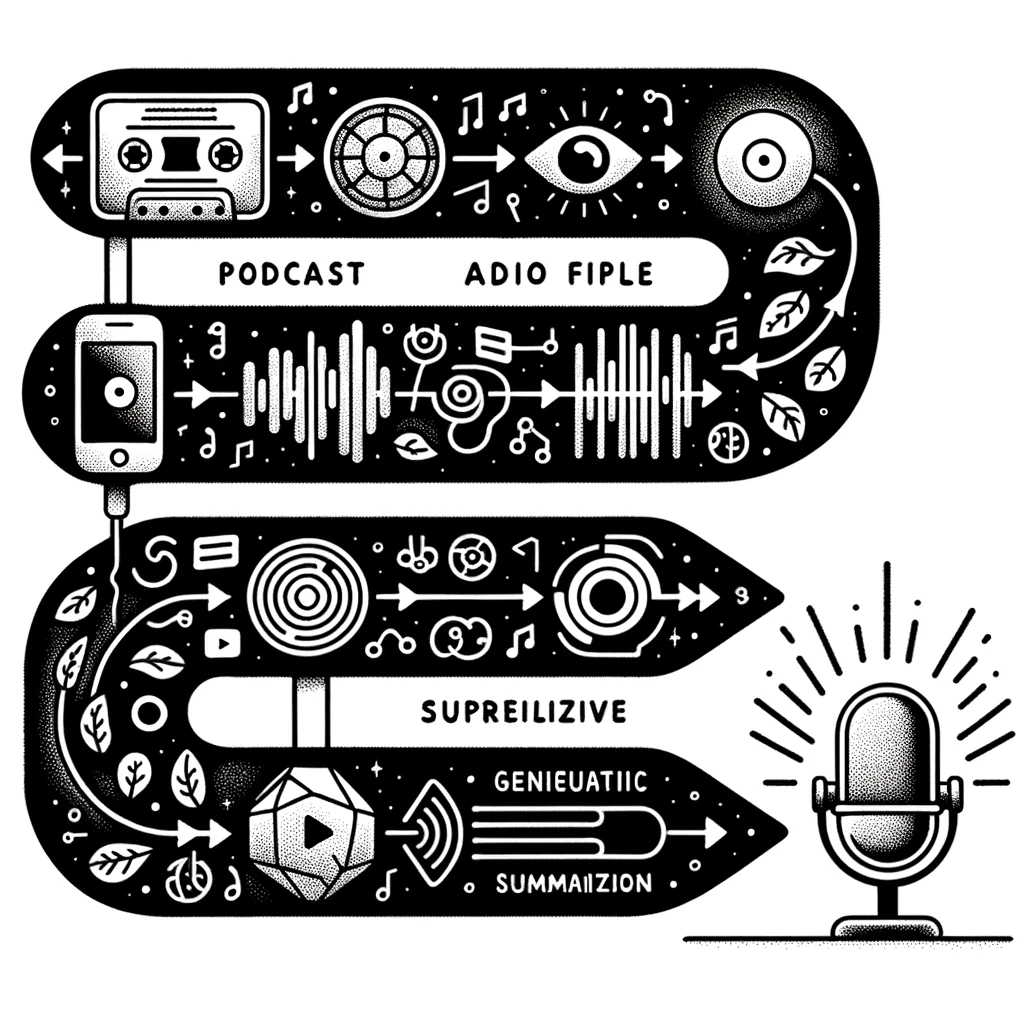Harnessing AI for Audio Summarization: A Versatik Use Case

Use case
Maximizing Podcast Potential: The Power of AI for Content Creators
The digital age has ushered in a plethora of content formats, with podcasts being a significant player. However, the sheer volume of available audio content can be overwhelming. How does one keep up, especially when time is limited? Versatik embarked on a mission to address this challenge by harnessing the capabilities of Artificial Intelligence.
The podcast
Podcast episode: Trash Talk: How to transform our approach to waste management
https://podcasts.ox.ac.uk/trash-talk-how-transform-our-approach-waste-management
Future of Business
Audio summarization of a podcast: how did we do it?
Transcribing a Podcast with Speech-to-Text
The first step was to transcribe the spoken words into text. Using advanced speech-to-text technologies, Versatik was able to convert an entire English podcast episode into a written format. This transcription served as the foundation for the subsequent stages of the process.
Distinguishing Speakers with Diarization
Anyone who’s listened to a podcast knows that multiple speakers can be involved. Differentiating between these speakers is crucial for context and clarity. Versatik employed diarization – a process that identifies and segregates different speakers within an audio file. This ensured that the transcription clearly indicated when a speaker changed, making the content easier to follow and understand.
Summarizing Using Generative AI
With the transcription in hand and speakers identified, the next challenge was to distill the podcast’s essence without losing its core message. Generative AI was the tool of choice. By analyzing the transcribed content, the AI was able to produce a concise summary that retained the podcast’s key points and insights.
From Text Back to Audio with TTS Technologies
But Versatik didn’t stop there. Recognizing the popularity of audio content, the summarized text was then converted back into audio using cutting-edge Text-to-Speech (TTS) technologies. This produced a brief audio summary of the original podcast, offering listeners a quick overview without the need to listen to the entire episode.
Applications and Implications
The potential applications of this approach are vast. Beyond podcasts, this method can be employed for summarizing meetings, academic courses, conferences, and radio programs. For businesses, it means more efficient meetings with clear takeaways. For students, it can provide concise revision notes from lengthy lectures. Attendees of long conferences can quickly recap sessions they might have missed. Radio enthusiasts can catch up on their favorite shows in a fraction of the time.
These summaries can serve as quick references, be shared with individuals who might benefit from the content, or be used to decide if delving into the complete material would be worthwhile. You can also use them for promotion on social media accounts.
Conclusion
At Versatik, the marriage of speech-to-text, diarization, generative AI, and TTS technologies has paved the way for innovative solutions in the realm of audio content. As the world becomes increasingly audio-focused, tools and techniques that help streamline and summarize will be invaluable in ensuring content remains accessible, digestible, and relevant.
The results
Future of Business: audio summary
Podcast transcript: 4765 words
Podcast summarization: 339 words
Summary:
In the *Future of Business* podcast episode, Katherine Dellar introduces her guest, Ryan Caplin, a fellow Oxford MBA student. Ryan shares his background as a father from the U.S., who recently completed a master’s in sustainability, with a focus on waste and circular economy in agriculture.
Ryan reflects on his initial expectations of Oxford and its intellectual environment. He shares how he got interested in waste management during his missionary work in Jamaica. The sight of waste lining beautiful landscapes and children playing in canals filled with garbage deeply affected him. This experience sparked his interest in the human connection with waste, its impact on the environment, and vice versa.
Ryan further elaborates on his subsequent research on waste management in developing countries, especially in Ghana, under the guidance of a Ghanaian PhD student. He found a discrepancy between public perception and the reality of waste management. While many believed that education and attitude were the main issues, Ryan identified the lack of effective waste management systems as the core problem.
Katherine and Ryan then delve into the basics of waste management, discussing its linear history and the shift towards circularity. They discuss the principles of the circular economy and its potential impact.
Ryan provides insights into waste management practices in Oxford, highlighting the use of anaerobic digestion facilities for organic waste. The discussion also touches on the challenges and opportunities in waste management, the role of businesses in adopting sustainable practices, and the potential of tech innovations like robotics, AI, and blockchain in the sector.
Ryan’s research on using black soldier fly larvae for organic waste management in Kenya offers a novel solution. These larvae consume waste and can be used as a high-protein feed source for animals, creating a circular system. Additionally, the process produces fertilizer, beneficial for crops.
Ryan envisions returning to either Kenya or Ghana post-MBA to work in the waste industry. He believes that the future of business will be characterized by unparalleled cooperation, focusing less on competitiveness and more on mutual interests.
Get In Touch
Interested in elevating your international sales strategy with the power of AI ? Versatik is here to help.
This site is protected by reCAPTCHA and the Google Privacy Policy and Terms of Service apply.
